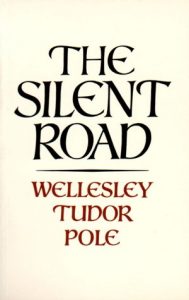The Silent Road
The Silent Road, in the Light of Personal Experience,
by Wellesley Tudor Pole.
Published by Neville Spearman, The C.W. Daniel Company, LTD, Great Britain, 1960-1987.
Wellesley Tudor Pole, 1884-1968, was 76 years old when The Silent Road was published in 1960. The initial publication was followed by a series of five impressions, the last made in 1987. Tudor Pole writes in the Foreword of the book: “The search for Truth is a personal and solitary adventure. All we can do is to share ideas with one another, in the hope that by doing so the light of understanding may bring us a little nearer to Reality. In the long run it is through silence, and not through speech, that Revelation is received.”
There is a quote on the back of the title page that reads, “Jesus said: ‘Let not him who seeks cease until he finds, and when he finds he shall be astonished; astonished he shall reach the Kingdom, and having reached the Kingdom he shall rest.” – From the Oxyrhynchus Papyrus, Third Century A.D.
Tudor Pole further prepares his readers for the extraordinary supernatural accounts in this book with a short first chapter that is titled Passers By: “There is a saying attributed to Jesus which is recorded in an early Coptic script found in Nag Hamadi, Egypt, some years ago. According to this saying, Jesus enjoined those around him to learn how to regard their present existence on earth from the standpoint of a traveler in transit. (And Jesus said: ‘Learn to become Passers By’ – The Gospel According to Thomas.) This would suggest the wisdom of regarding life on earth as a temporary phase in a journey that acts as a link between a pre-existence and a future life. In my view such an attitude of mind can become the first step towards the extension of our perceptions and the widening of our understanding. It is my hope that the sharing of my personal experience in this field of research may prove of some service to those who are seeking but who have not yet found.”
In the lifelong heavenly experiences that Tudor Pole shares in this book (consisting of two Parts and 24 chapters), it is obvious through all processes and challenges that his feet have remained firmly on the ground. He was a businessman in industry, an Army officer in World War I, and the founder, with Winston Churchill, of the Big Ben Silent Minute in 1940, at the time of Dunkirk. (The Silent Minute is observed in the United States on Memorial Day, as well as after certain tragic events on a national scale.)
In addition to supernatural experiences, The Silent Road offers many teachings, for example, Spiritual Healing in Chapter Eight of Part I – which introduces Padro Pio and Abdul Bahá – and Seven Facets of the Mind, in Chapter Six of Part II. It should be noted, however, that Tudor Pole congenially sprinkles accounts of spiritual experiences throughout the teaching segments.
For purposes of this review, it is only possible to focus on one of the shared experiences, and an account from Further Unusual Incidents in Chapter Three of Part I is selected. This account, titled Transit Most Mysterious, describes a teleportation. In the dictionary, teleportation – defined as an act or process of moving an object or person by psychokinesis – is regarded as fiction. However, in Tudor Pole’s life, it really happened. “…When he finds he shall be astonished.”
“On a wet and stormy night in December 1952,” begins Tudor Pole, “I found myself in a country station some mile and a half from my Sussex home. The train from London had arrived late, the bus had gone and no taxis were available … The time was 5:55 p.m. and I was expecting an important trunk call from overseas at 6 p.m. at home. The situation seemed desperate … In despair I sat down in the waiting-room and, having nothing better to do, I compared my watch with the station clock … I was able to confirm the fact that the exact time was then 5:57 p.m. Three minutes to zero hour! What happened next I cannot say. When I came to myself I was standing in my hall at home, a good twenty minutes’ walk away, and the clock was striking six. My telephone call duly came through a few minutes later… Having finished my call, I awoke to the realisation that something very strange had happened… I found that my shoes were dry and free from mud, and that my clothes showed no sign of damp or damage. My housekeeper looked at me somewhat strangely at supper that night, but no word was said. Indeed, what ‘word’ was there to say?”
Lastly, the friendship between Major Tudor Pole and Abdul Bahá, 1844-1921, is of great importance and must be touched upon. Abdul Bahá was the eldest son and successor of the Persian prophet, Bahá-u-lláh, 1817-1892, founder of the Bahái Faith and considered to be a messianic figure.
Wellesley Tudor Pole met Abdul Bahá in Egypt in 1908. From Bahaikipedia online: “In 1911, Abdul Bahá stayed at the Clifton Guest House owned by Major Tudor Pole… In 1917, when the British Army was advancing through Palestine, Tudor Pole was instrumental in alerting the Ministry of Defense of the possible plight of Abdul Bahá. Although Wellesley Tudor Pole never formally declared himself as a Bahái, his book, Writing on the Ground, is about Abdul Bahá and the Bahái Faith. There are people who become Bahái’s after reading this book.”
The Bahai Library on-line offers excerpts from the book’s dust jacket, as well as the section from pages 75-80 which mention Abdul Bahá.
This is found at: https://bahai-library.com/pole_silent_road
The Library has also kindly made the complete book available as a PDF at:
https://bahai-library.com/pdf/p/pole_silent_road.pdf
Review by Martha Keltz

